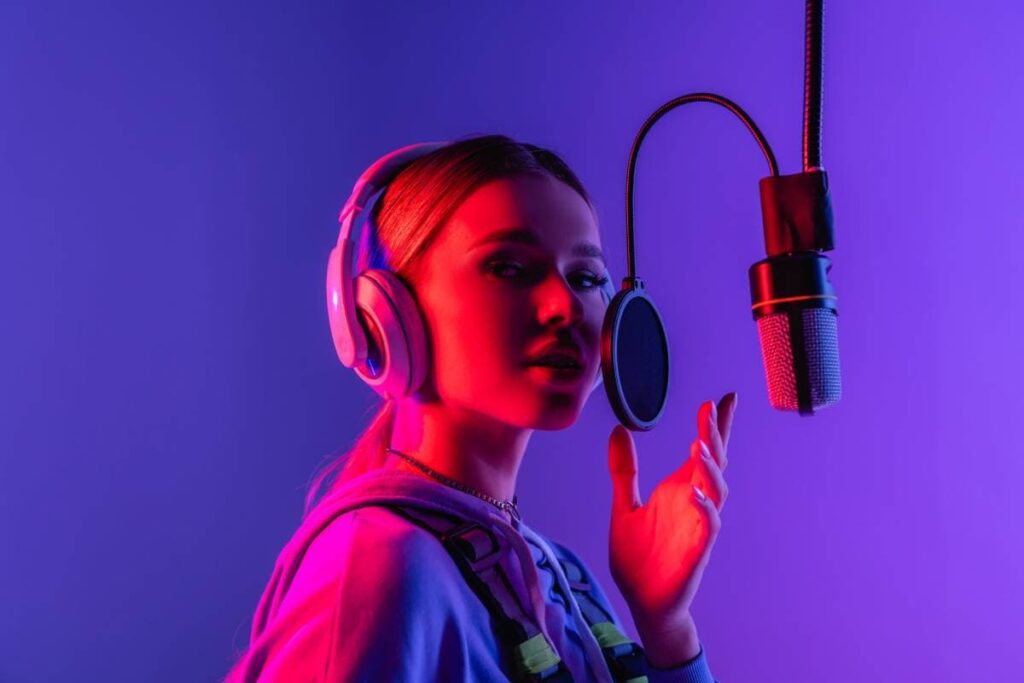A good pair of headphones is a must for anyone who plans to record and produce music, especially if they compile multiple layers of music into one composition. Using Bluetooth headphones may seem like a convenient proposition given the absence of wires, but is it a good idea to go wireless when recording audio?
You can use Bluetooth headphones to record and produce music. However, you must deal with latency, data compression, connectivity issues, and a depleting battery. These issues can offset the convenience of not having cables and even affect the outcome of your composition.
Continue reading to explore using wireless headphones for music recording and production. This article will cover the implications of using Bluetooth headphones and discuss other equipment you can use to record and produce music.
Table of Contents

Why Bluetooth Headphones Aren’t Ideal for Recording
Technology has evolved so much that almost anyone can have a recording studio in their own home. You no longer need fancy equipment to compose music if you have a computer, the necessary software, a microphone, and something to listen to your music with, like headphones or studio monitors.
Using Bluetooth headphones is tempting since the lack of wires makes it easier to move around, and they seem to work well when listening to your favorite tunes. However, it’s different if you’re trying to produce music because not having any wires has its share of drawbacks.
Latency
Bluetooth devices have come a long way since the technology was first introduced in 1999. Through the years, several versions of Bluetooth have been released, offering faster transmission of data, better range, and less latency.
But despite technological advancements, Bluetooth still suffers from latency compared to wired devices. The latest version of Bluetooth (aptX Low Latency) still has a latency of 34 milliseconds, which is still significant, considering wired headphones have a latency of only 5 to 10 milliseconds.
Average headphones have a latency of around 150 milliseconds.
Latency in Bluetooth headphones occurs because raw data cannot be transferred wirelessly. The data must be compressed and converted into an analog audio signal before it becomes audible. This entire process takes time.
A small fraction of a second may not matter when you’re listening to music, but it will become noticeable when you’re watching a movie or recording music. Imagine watching a movie where the actors’ voices don’t match their lip movements. The latency is even more frustrating if you’re trying to record audio.
How Latency Affects a Recording
Musical compositions are essentially layers of individually-recorded sounds. Let’s say you wanted to record a band consisting of 3 musicians: a vocalist, a drummer, and a guitarist. The recording would sound so much better if you recorded each musician individually instead of the entire band.
Recording each musician one by one prevents bleeding, where the microphone picks up sound from other instruments. This method of recording leads to a cleaner sound and gives the person mixing the record more flexibility.
Headphones are essential for this recording method since the musicians need to hear the other tracks to remain in sync with the other members. Any latency in the headphones can ruin the timing of the musician, causing them to go off-beat.
Data Compression
Music production in the modern world makes use of digital audio files. Each file contains all the information needed to make an analog audio signal we can hear. As mentioned earlier, Bluetooth devices must compress this data before converting it into an audible signal.
The reason for data compression is to minimize latency, but it also means that certain details of the sound are removed since less data is processed. In short, data compression compromises the quality and accuracy of the recording.
So, using Bluetooth headphones to mix and fine-tune a recording can skew what you’re hearing and affect the outcome of the composition.
Connectivity Issues
Bluetooth headphones are also prone to electrical interference and connectivity issues. These issues can interrupt sound transmission or cause unwanted noise, which is the last thing you want when producing or recording music.
Modern Bluetooth headphones have a better range and are less prone to these gremlins, but wired headphones still offer better connectivity.
Battery Depletion
Another drawback of using Bluetooth headphones is that you have to keep their battery charged. Granted that the batteries in some headphones can take days to drain, it’s easy to neglect to charge them when you spend hours producing music.
Some Bluetooth headphones also have an audible prompt to tell you that the battery is running low, which can be a nuisance while working on something. Battery depletion may not be a big deal, but it’s still a drawback, something you don’t have to worry about with wired headphones.
I’ve also written a guide where I cover how you can use your headphones to record audio with high quality. I recommend reading it before getting started. The Ultimate Guide to Recording Audio With Headphones
Headphones and Studio Monitors
Given all the disadvantages of using Bluetooth headphones, alternatives for music recording and production are worth considering. Studio monitors are the best speakers for music production, but you also need headphones if you plan on recording multiple instruments.
You can technically use headphones for music production, but know that studio monitors have specific qualities that make them more suitable.
If you want to buy a new pair of headphones, don’t finalize your decision until you’ve read my guide about open-backed headphones. I cover the differences with closed-back headphones and tell you which criteria to consider when deciding, in my article Are Open-Back Headphones Worth It? How To Decide.
Frequency Response
When producing music, you need speakers that have accurate sound reproduction. Studio monitors have realistic sound output since they have a flat frequency response. Most headphones are made for music consumers, so their frequency response has peaks and dips, affecting how you tweak the recording.
Crossfeed
Headphones also have zero crossfeed, where your left ear only hears the left speaker and your right ear only hears the right speaker. Studio monitors allow both ears to hear sounds from both speakers, which better replicates a typical listening environment.
Using headphones can affect your panning adjustments since any bias to one particular side can easily be heard.
Conclusion
Headphones are essential for recording music, and studio monitors are suitable for music production. Bluetooth headphones will work with most computers, and while they offer the convenience of being wireless, there are just too many disadvantages to consider them fit for recording.
So, just because you can use Bluetooth headphones for recording, it doesn’t mean you should. Stick with wired headphones.
- Review of the ALABS IRON MINI-WL: A Powerhouse Wireless Microphone - October 4, 2023
- What is a Saturator in Music Production: A Brief Explanation - May 11, 2023
- What Are Rotary DJ Mixers? An Overview - May 11, 2023
SoundStudiomagic.com is a participant in the Amazon Services LLC Associates Program, an affiliate advertising program designed to provide a means for sites to earn advertising fees by advertising and linking to Amazon.com. We also participate in other affiliate programs which compensate us for referring traffic.

